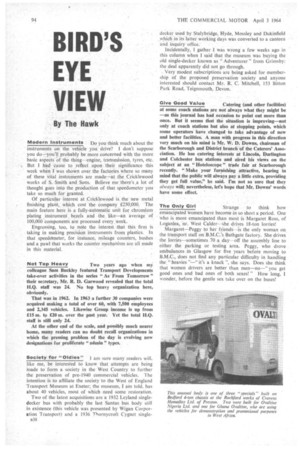BIRD'S EYE VIEW
Page 96

If you've noticed an error in this article please click here to report it so we can fix it.
By The Hawk
Modern Instruments Do you think much about the instruments on the vehicle you drive? I don't suppose you do--you'll probably be more concerned with the more basic aspects of the thing—engine, transmission, tyres, etc. But I had cause to reflect upon their significance this week when I was shown over the factories where so many of these vital instrunients are made—at the Cricklewood works of S. Smith and Sons. Believe me.there's.,a lot of thought goes into the production of that speedometer you take so much for granted.
Of particular interest at Cricklewood is the new metal finishing plant, which cost the company £250,000. The main feature here is a fully-automatic unit for chromium plating tinstrument bezels and the like—an average of 100,000 components are processed every week.
Engrossing, too, to note the interest that this firm is taking in making precision instruments from plastics. In that speedotneter, for instance, mileage counters, bushes and a pawl that works the counter mechanism are all made in this material.
Not Top Heavy Two years ago when my
colleague Sam Buckley featured Transport Developments take-over activities in the series "As From Tomorrow" their secretary, Mr. R. D. Garwood revealed that the total H.Q. staff was 24. No top heavy organization here, obviously.
That was in 1962. In 1963 a further 30 companies were acquired making a total of over 60, with 7,500 employees and 2,345 vehicles. Likewise Group income is up from 15 m. to £20 in. over the past year. Yet the total H.Q. staff is still only 24.
At the other end of the scale, and possibly much nearer home, many readers can no doubt recall organizations in which the pressing problem of the day is evolving new designations for proliferate " admin " types.
Society for "Oldies" I am sure many readers will, like me, be interested to know that attempts are being made to form a society in the West Country to further the preservation of pre-1940 commercial vehicles. The intention is to affiliate the society to the West of England Transport Museum at Exeter; the museum, I am told, has about 40 vehicles, most of which need some restoration.
Two of the latest acquisitions are a 1932 Leyland singledecker bus with probably the last Santus bus body still in existence (this vehicle was presented by Wigan Corporation Transport) and a 1936 Thornycroft Cygnet single B38 decker used by Stalybridge, Hyde, Mossley and Dukinfield which in its latter working days was converted to a canteen and inquiry office.
Incidentally, I gather I was wrong a few weeks ago in this column when I said that the museum was buying the old single-decker known as " Adventurer " from Grimsby: the deal apparently did not go through.
Very modest subscriptions are being asked for membership of the proposed preservation society and anyone interested should contact Mr. R. C. Mitchell, 153 Bitton Park Road, Teignmouth, Devon.
Catering (and other facilities) at some coach stations are not always what they might be —as this journal has had occasion to point out more than once. But it seems that the situation is improving—not only at coach stations but also at stopping points, which some operators have changed to take advantage of new and better facilities. A man with progress in this direction very much on his mind is Mr. W. D. Downs, chairman of the Scarborough and District branch of the Caterers' Association. He has catering interests at Lincoln, Darlington and Colchester bus stations and aired his views on the subject at an " Hoteloscope " trade fair at Scarborough recently. "Make your furnishing attractive, bearing in mind that the public will always pay a little extra, providing they get full value," he said. I'm not SQ sure that they always will; nevertheless, let's hope that Mr. Downs' words have some effect.
Give Good Value Strange to think how emancipated women have become in so short a period. One who is more emancipated than most is Margaret Ross, of Loganlea, nr. West Calder—she drives 18-ton lorries!
Margaret—Peggy to her friends--is the only woman on the transport staff on B".M.C.'s Bathgate factory. She drives the lorries—sometimes 70 a day—off the assembly line to either the parking or testing area. Peggy, who drove ambulances in Glasgow for five years before moving to 13.M.C., does not find any particular difficulty in handling the "heavies "—" it's a knack ", she says. Does she think that women drivers are better than men—no—" you get good ones and bad ones of both sexes!" How long, I wonder, before the gentle sex take over on the buses! The Only Girl












































































































































